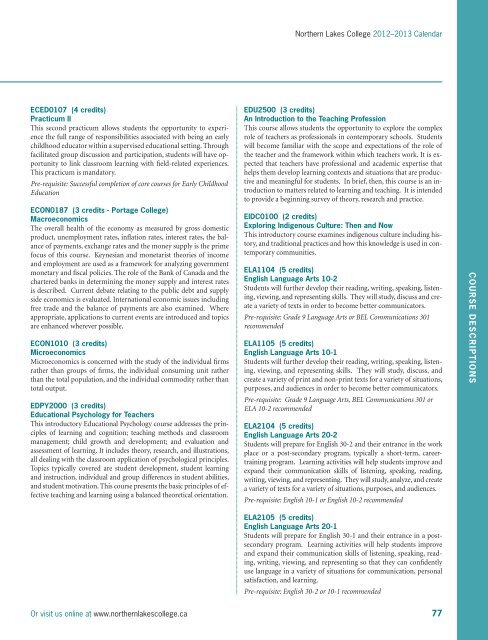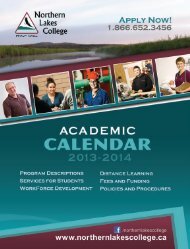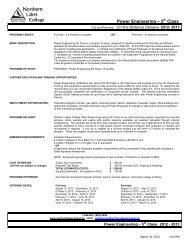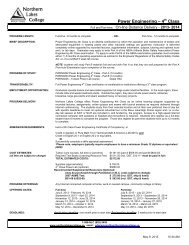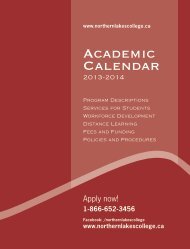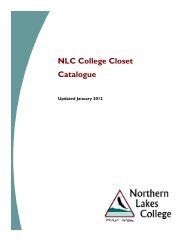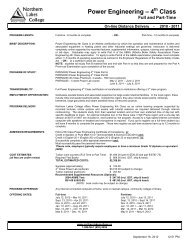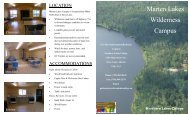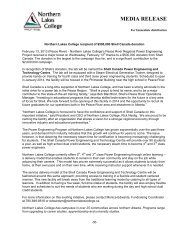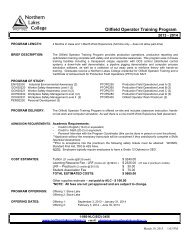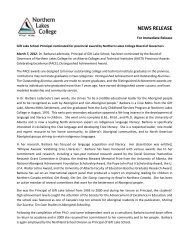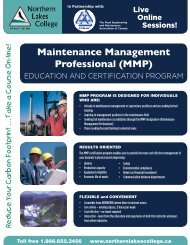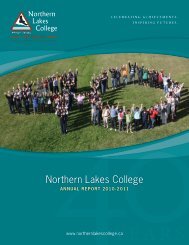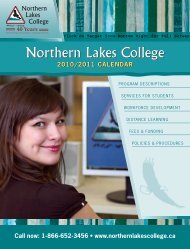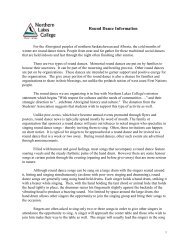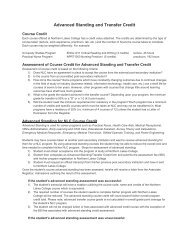NLC Calendar - Northern Lakes College
NLC Calendar - Northern Lakes College
NLC Calendar - Northern Lakes College
You also want an ePaper? Increase the reach of your titles
YUMPU automatically turns print PDFs into web optimized ePapers that Google loves.
<strong>Northern</strong> <strong>Lakes</strong> <strong>College</strong> 2012–2013 <strong>Calendar</strong><br />
ECED0107 (4 credits)<br />
Practicum II<br />
This second practicum allows students the opportunity to experience<br />
the full range of responsibilities associated with being an early<br />
childhood educator within a supervised educational setting. Through<br />
facilitated group discussion and participation, students will have opportunity<br />
to link classroom learning with field-related experiences.<br />
This practicum is mandatory.<br />
Pre-requisite: Successful completion of core courses for Early Childhood<br />
Education<br />
ECON0187 (3 credits - Portage <strong>College</strong>)<br />
Macroeconomics<br />
The overall health of the economy as measured by gross domestic<br />
product, unemployment rates, inflation rates, interest rates, the balance<br />
of payments, exchange rates and the money supply is the prime<br />
focus of this course. Keynesian and monetarist theories of income<br />
and employment are used as a framework for analyzing government<br />
monetary and fiscal policies. The role of the Bank of Canada and the<br />
chartered banks in determining the money supply and interest rates<br />
is described. Current debate relating to the public debt and supply<br />
side economics is evaluated. International economic issues including<br />
free trade and the balance of payments are also examined. Where<br />
appropriate, applications to current events are introduced and topics<br />
are enhanced wherever possible.<br />
ECON1010 (3 credits)<br />
Microeconomics<br />
Microeconomics is concerned with the study of the individual firms<br />
rather than groups of firms, the individual consuming unit rather<br />
than the total population, and the individual commodity rather than<br />
total output.<br />
EDPY2000 (3 credits)<br />
Educational Psychology for Teachers<br />
This introductory Educational Psychology course addresses the principles<br />
of learning and cognition; teaching methods and classroom<br />
management; child growth and development; and evaluation and<br />
assessment of learning. It includes theory, research, and illustrations,<br />
all dealing with the classroom application of psychological principles.<br />
Topics typically covered are student development, student learning<br />
and instruction, individual and group differences in student abilities,<br />
and student motivation. This course presents the basic principles of effective<br />
teaching and learning using a balanced theoretical orientation.<br />
EDU2500 (3 credits)<br />
An Introduction to the Teaching Profession<br />
This course allows students the opportunity to explore the complex<br />
role of teachers as professionals in contemporary schools. Students<br />
will become familiar with the scope and expectations of the role of<br />
the teacher and the framework within which teachers work. It is expected<br />
that teachers have professional and academic expertise that<br />
helps them develop learning contexts and situations that are productive<br />
and meaningful for students. In brief, then, this course is an introduction<br />
to matters related to learning and teaching. It is intended<br />
to provide a beginning survey of theory, research and practice.<br />
EIDC0100 (2 credits)<br />
Exploring Indigenous Culture: Then and Now<br />
This introductory course examines indigenous culture including history,<br />
and traditional practices and how this knowledge is used in contemporary<br />
communities.<br />
ELA1104 (5 credits)<br />
English Language Arts 10-2<br />
Students will further develop their reading, writing, speaking, listening,<br />
viewing, and representing skills. They will study, discuss and create<br />
a variety of texts in order to become better communicators.<br />
Pre-requisite: Grade 9 Language Arts or BEL Communications 301<br />
recommended<br />
ELA1105 (5 credits)<br />
English Language Arts 10-1<br />
Students will further develop their reading, writing, speaking, listening,<br />
viewing, and representing skills. They will study, discuss, and<br />
create a variety of print and non-print texts for a variety of situations,<br />
purposes, and audiences in order to become better communicators.<br />
Pre-requisite: Grade 9 Language Arts, BEL Communications 301 or<br />
ELA 10-2 recommended<br />
ELA2104 (5 credits)<br />
English Language Arts 20-2<br />
Students will prepare for English 30-2 and their entrance in the work<br />
place or a post-secondary program, typically a short-term, careertraining<br />
program. Learning activities will help students improve and<br />
expand their communication skills of listening, speaking, reading,<br />
writing, viewing, and representing. They will study, analyze, and create<br />
a variety of texts for a variety of situations, purposes, and audiences.<br />
Pre-requisite: English 10-1 or English 10-2 recommended<br />
course descriptions<br />
ELA2105 (5 credits)<br />
English Language Arts 20-1<br />
Students will prepare for English 30-1 and their entrance in a postsecondary<br />
program. Learning activities will help students improve<br />
and expand their communication skills of listening, speaking, reading,<br />
writing, viewing, and representing so that they can confidently<br />
use language in a variety of situations for communication, personal<br />
satisfaction, and learning.<br />
Pre-requisite: English 30-2 or 10-1 recommended<br />
Or visit us online at www.northernlakescollege.ca<br />
77


